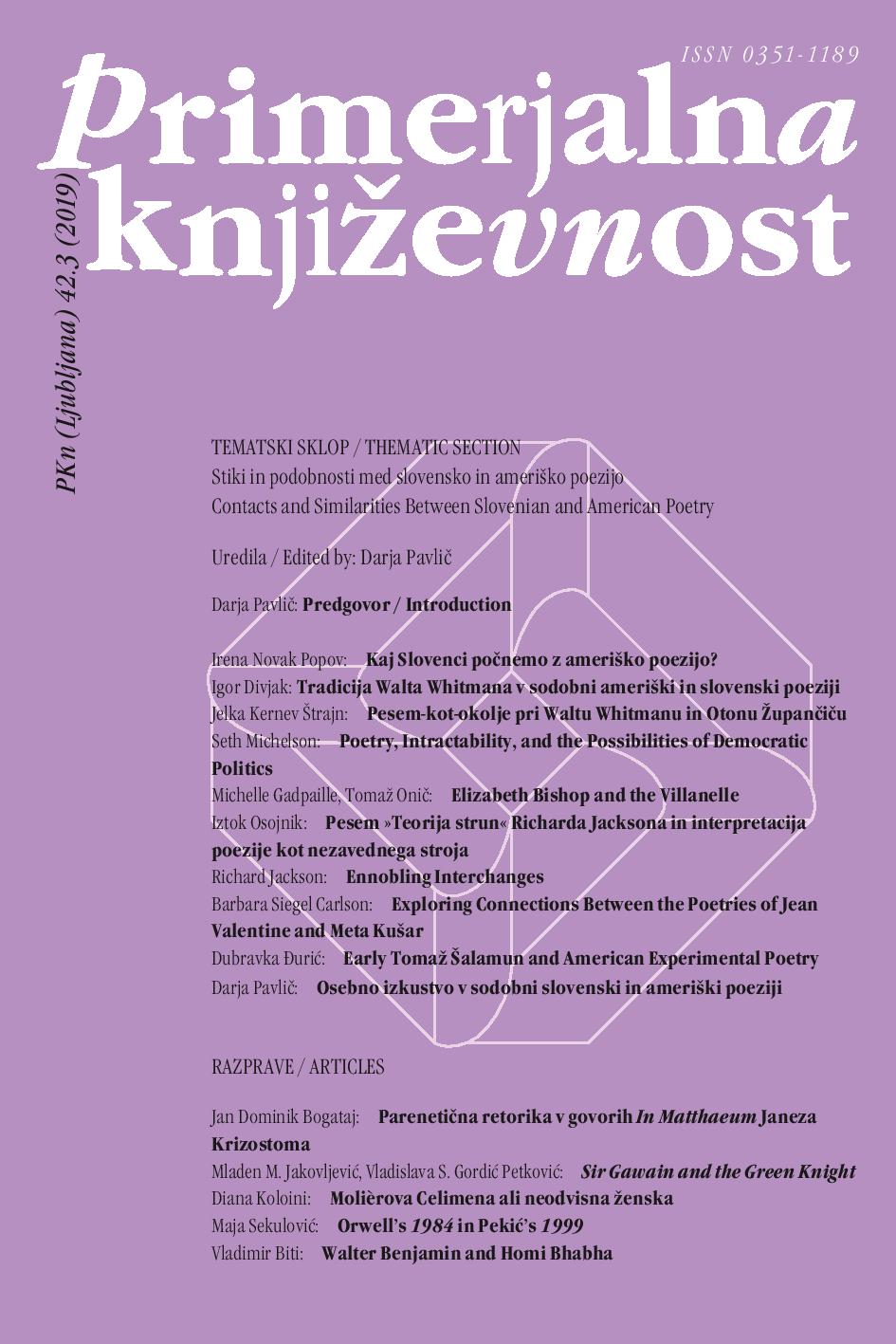Orwell’s 1984 in Pekić’s 1999: Intertextual Relations
DOI:
https://doi.org/10.3986/pkn.v42.i3.14Keywords:
English literature, Serbian literature, comparative studies, dystopia, dystopian novel, intertextuality, Orwell, George, 1984, Pekić, Borislav, 1999Abstract
This paper examines intertextual relations between two dystopian novels – Borislav Pekić’s anthropological account entitled 1999 and George Orwell’s 1984. In postmodernism, the literary movement which Pekić’s oeuvre belongs to in terms of poetic principles, intertextual dialogue is very active and dominant. I argue that Orwell’s novel serves as a proto-text or an inspiration for Pekić in constructing his own narrative. This is particularly reflected in the conceptual organization of key elements of the narrative structure such as chronotope and characters. The dominant spatial structure taken over from Orwell is the Golden Country, a pasture where all important events in the novel take place. Similarly, the prominent temporal determinant, i.e. the year 1999, becomes a symbol just as it is the case with 1984. As regards the constructs of the plot, i.e. the characters, it is proposed that Pekić’s Arno and the mole emerge as counterparts to Orwell’s Winston and O’Brien. The chronotope of meeting, along with the resonant sentences “We shall meet in the place where there is no darkness” and “We shall meet when flowers bloom again,” is a constant in both narrative structures. Regarding personality traits, Pekić’s last man in the world, i.e. Arno, is well-matched with Winston, Orwell’s last man. Both are modelled as aloof, lonely in their lives and ideas, and as individuals juxtaposed with the group. Furthermore, Pekić treats the motifs of love, history and rats similarly to the way Orwell does. Love fails to ensure the survival of humankind, historical facts are misrepresented, while the motif of rats metaphorically represents danger inboth texts.References
Ahmetagić, Jasmina. Antički mit u prozi Borislava Pekića. Beograd: Književna reč, 2001.
Bakhtin, Mikhail. The Dialogic Imagination: Four Essays. Ed. Michael Holquist. Trans. Caryl Emerson and Michael Holquist. Austin, TX: University of Texas Press, 1982.
Bal, Mieke. Narratology: Introduction to the Theory of Narrative. Toronto: University of Toronto Press, 1997.
Barthes, Roland. Oeuvres complètes II. Paris: Seuil, 1994.
Baturan, Radomir. Romani Borislava Pekića. Nikšić: NIO Univerzitetska riječ, 1989.
Bužinjska, Ana; Markovski, Mihail Pavel. Književne teorije XX veka. Beograd: Službeni glasnik, 2009.
Chevalier, Jean; Gheerbrant, Alain. Rječnik simbola. Zagreb: Nakladni zavod Matice hrvatske, Mladost, 1994.
Claeys, Gregory. Dystopia: A Natural History: A Study of Modern Despotism, Its Antecedents, and Its Literary Diffractions. Oxford: Oxford University Press, 2017.
Cvijetić, Maja. Pekićev Orvel. Beograd: Plato, 2007.
Damjanov, Sava. “Utopijsko-antiutopijski čitalac Borislav Pekić.” Poetika Borislava Pekića: preplitanje žanrova. Ed. Petar Pijanović and Aleksandar Jerkov. Beograd: Institut za književnost i umetnost, Službeni glasnik, 2009. 479–483.
Epstein, Mikhail N. Postmodernizam. Beograd: Slovo, 1998.
Foucault, Michel. The Archaeology of Knowledge. Trans. A. M. Sheridan Smith. New York: Pantheon, 1972.
Hutcheon, Linda. The Poetics of Postmodernism: History, Theory, Fiction. New York: Routledge, 1988.
Jerkov, Aleksandar. Nova tekstualnost. Podgorica, Nikšić, Beograd: Unireks, Prosveta, Oktoih, 1992.
Jović, Bojan. “O nekim izvorima Pekićevih robotskih antropopeja.” Poetika Borislava Pekića: preplitanje žanrova. Ed. Petar Pijanović and Aleksandar Jerkov. Beograd: Institut za književnost i umetnost, Službeni glasnik, 2009. 485–495.
Juvan, Marko. Intertekstualnost. Trans. Bojana Stojanović Pantović. Novi Sad: Akademska knjiga, 2013.
Kristeva, Julia. Desire in Language: A Semiotic Approach to Literature and Art. Ed. Leon S. Roudiez. Trans. T. Gora et al. New York: Columbia University Press, 1980.
Lazić, Nebojša. Antiutopijska trilogija Borislava Pekića: poetika romana Besnilo, 1999, Atlantida. Leposavić: Narodna biblioteka Sveti Sava, 2013.
Lešić, Zdenko. Teorija književnosti. Beograd: Službeni glasnik, 2008.
Lucy, Niall. Postmodern Literary Theory: An Introduction. Oxford: Blackwell, 1997.
Maširević, Ljubomir. “Kultura intertekstualnosti.” Zbornik radova Fakulteta dramskih umetnosti 11–12 (2007). 421–431.
Milošević, Nikola. “Borislav Pekić i njegova ‘mitomahija’.” Uspenje i sunovrat Ikara Gubelkijana i Odbrana i poslednji dani. Ljubljana, Beograd: IPO Partizanska knjiga, OOUR Izdavačko publicistička djelatnost, 1984.
Mocna, Irina. “Arhetipski sižei, motivi i likovi u antiutopijskoj trilogiji Borislava Pekića.” Poetika Borislava Pekića: preplitanje žanrova. Ed. Petar Pijanović and Aleksandar Jerkov. Beograd: Institut za književnost i umetnost, Službeni glasnik, 2009. 504–514.
Mustedanagić, Lidija. Groteskni brevijar Borislava Pekića. Novi Sad: Stylos, 2002.
Orwell, George. 1984. Belgrade: Libretto, 2004.
Pekić, Borislav. “Dok osećate stid, nade ima, ili kaverna nije metafora.” Vreme reči. Beograd: BIGZ, SKZ, 1993. 7–19.
– – –. “Književnost je uglavnom korisna laž.” Vreme reči. Beograd: BIGZ, SKZ, 1993. 277–283.
– – –. “Kroz 1984. odavno smo prošli.” Vreme reči. Beograd: BIGZ, SKZ 1993. 206–225.
– – –. “Nisam Japanac izgubljen u džungli.” Vreme reči. Beograd: BIGZ, SKZ, 1993. 138–170.
– – –. “Komentari i studije za 1999.” Rađanje Atlantide. Beograd: BIGZ, 1996. 275–306.
– – –. 1999. Novi Sad: Solaris, 2006.
Pijanović, Petar. Poetika romana Borislava Pekića. Beograd: Prosveta, 1989.
Puhar, Alenka. “Orwellovo tihotapljenje na Kranjsko.” George Orwell. Živalska farma. Ljubljana: Mladinska knjiga, 2001.
Riffaterre, Michael. “Syllepsis.” Critical Inquiry 7 (1980). 625–638.
Rupel, Dimitrij. “Okrog leta 1984.” George Orwell. 1984. Ljubljana: Mladinska knjiga, 1983.
Sargent, Lyman Tower. “The Three Faces of Utopianism Revisited.” Utopian Studies 5.1 (1994). 1–37.
Sekulović, Maja. “Poetika Pekićevog žanr-romana Besnilo.” Slavistična revija 65.2 (2017). 323–340.
Sisk, David W. Transformations of Language in Modern Dystopias. Westport: Greenwood Press, 1997.
Stojanović, Milena. Književni vrt Borislava Pekića. Beograd, Pančevo: Mali Nemo, Institut za književnost i umetnost, 2004.
Vukićević Janković, Vesna. “Atlantida kao Pekićev antropološki epos.” Studi Slavistici (2013). 193–203.


